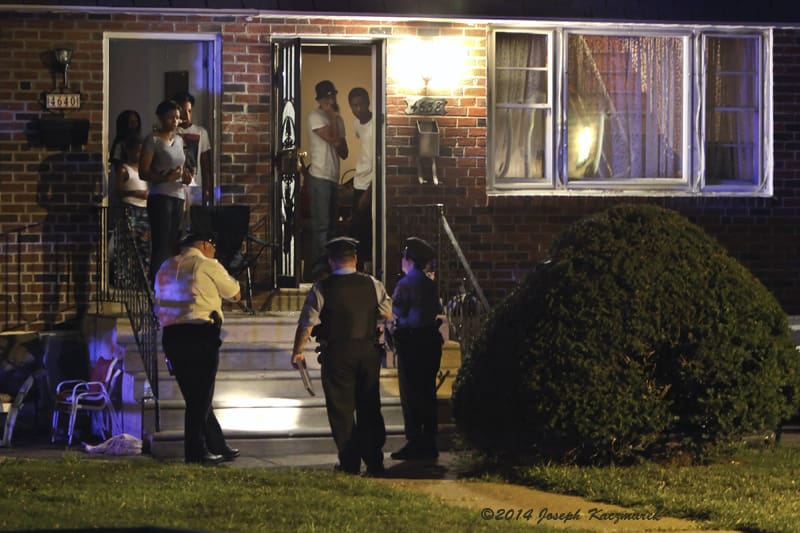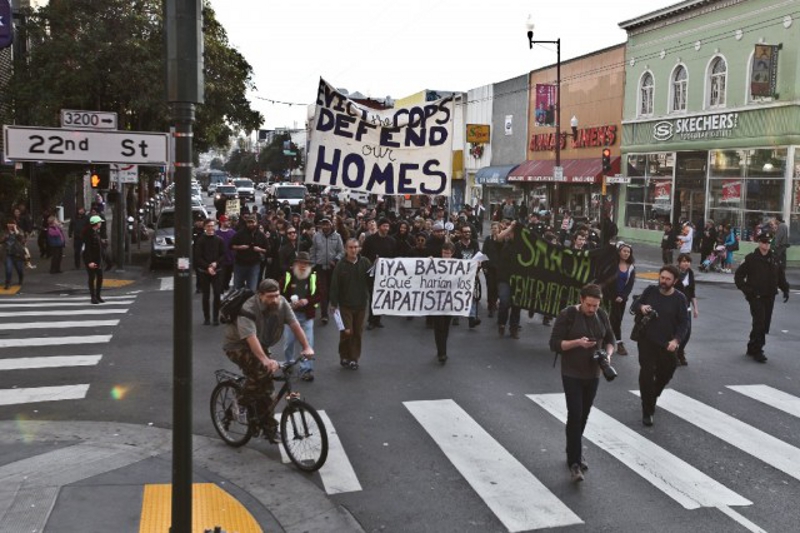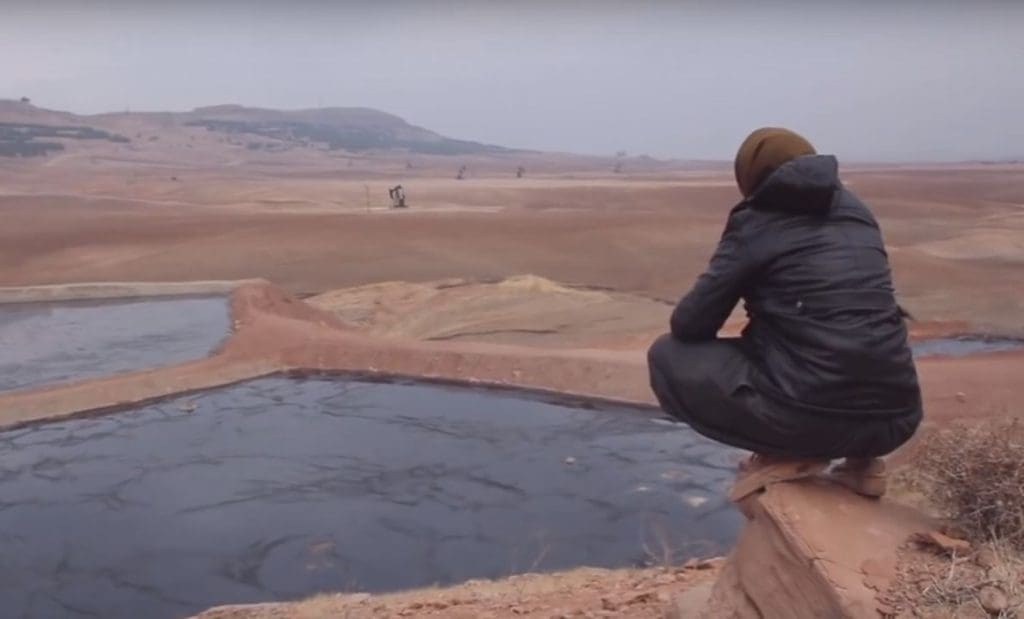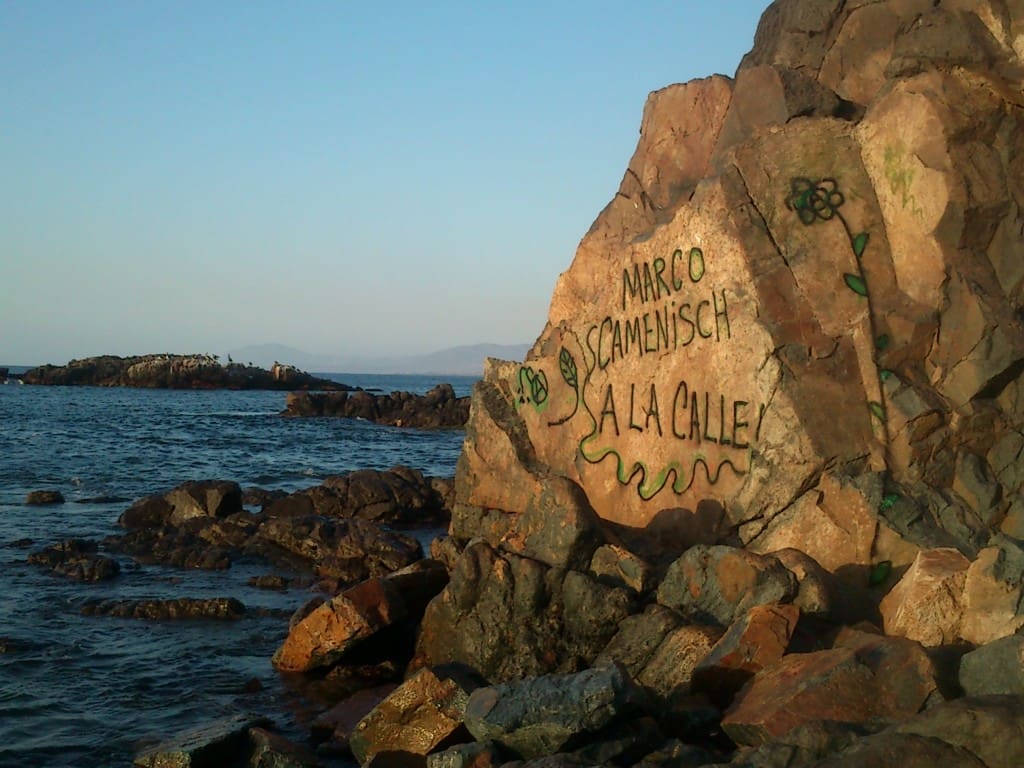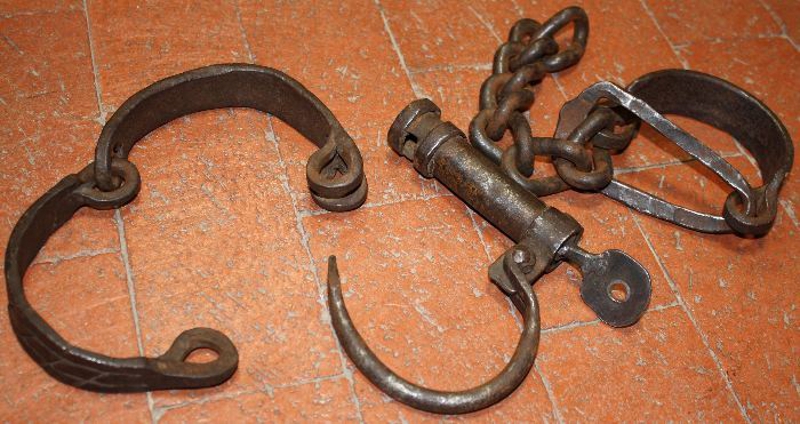Transcribed from This is Hell! Radio’s 24 May 2014 episode and printed with permission. Listen to the full interview:
“When you’re a target of the police, you want to be an unpredictable person. You don’t want to show up routinely anywhere. You don’t want to go to the hospital when you’ve been injured or when your baby is born. You don’t want to go to your mother’s house on Christmas. Who knows who will be there to take you into custody?”
Chuck Mertz: On the line with us right now is Alice Goffman. She is Assistant Professor of Sociology at the University of Wisconsin, Madison, and the author of the new book On the Run: Fugitive Life in an American City. Good morning, Alice.
Alice Goffman: Good morning! Great to be here.
CM: Thank you so much for being on our show this morning. This is an amazing book, and it touches on a lot of things that we have been discussing on our show over the last few weeks.
You write, “in the 1960s and the 1970s, black Americans achieved the full rights of citizenship that had eluded them for centuries. As they successfully defended the right to vote, to move freely, to attend college, and to practice their chosen profession, the United States simultaneously began building up a penal system with no historic precedent or international comparison.”
Did the U.S. eliminate one form of institutional racism for another type of institutional racism, and that is the get-tough-on-crime ideology?
AG: I think that’s right, yes. The U.S. now imprisons five to nine times more people than Western European nations, and significantly more than China and Russia. Three percent of adults in the nation are under correctional supervision: 2.2 million people in prisons and jails, another 4.8 million on probation and parole. Only the forced labor camps in the USSR under Stalin approached these levels of confinement, and those numbers are pretty serious.
But those numbers look like nothing if you disaggregate and look at what’s happening to African American young people. Black people make up 13% of the U.S. population but account for 37% of the prison population. And we know that black people don’t use or sell drugs more than white people, but they’re certainly getting arrested more often and imprisoned for longer. For black young men, one in nine are in prison, compared to only two percent for white young men.
It’s also reinforced by class differences. It’s poor African American young men who are being sent to prison at really astounding rates. Between sixty and seventy percent of African American young men who did not finish high school will be in prison by their mid-thirties.
CM: Alice Goffman spent six years living in the Sixth Street neighborhood in Philadelphia, a disadvantaged neighborhood. Her book On the Run offers “gripping accounts of daily life in the forgotten neighborhoods of American cities.”
“Forgotten neighborhoods.” I love that term, because on ABC World News, whenever they do any coverage of something happening in predominantly black neighborhoods in the inner city, they call that segment “Hidden America.”
Who is this America hidden from?
AG: Certainly not from the many people who are living in poor communities of color. The things that I talk about in the book are not at all surprising to people who are living in neighborhoods in Los Angeles and Chicago and New York and Boston and parts of the South. But what’s going on was certainly a shock to me as a white middle class person growing up fifteen blocks away from this neighborhood in Philadelphia. And when I talk about the book, a lot of it is shocking to people who live outside of communities like this.
We’re in a divided nation, and the levels of policing and arrests and searches and house raids and this whole underground world of surveillance that I write about, this fugitive life, is very unknown to many people who don’t even live that far away, but live far enough away.
CM: The way that you describe it in your book, it often reminded me of the house raids that the U.S. military does in Afghanistan or Iraq, and it reminded me of an interview that we did with Alfred McCoy years ago; he was talking about drones. He said, “anything that the United States military does overseas, you can bet it will be coming back here to the United States.”
When you were living in the Sixth Street neighborhood, did you ever get the feeling that you were living in an area that was under occupation by a military force, except it was the police?
AG: I think many people in the neighborhood do feel that way. On the one hand, crime and violence are real problems that people are dealing with—coming out of a context of severe economic dislocation and acute poverty—but don’t know what recourse there is apart from the police. But on the other hand many people talk about the police as an occupying force. Gone are the days of neighborhood cops patrolling on foot, who are known by residents and who can mediate disputes.
What we’re seeing now is a series of anonymous task forces who come into the neighborhood tasked with making large numbers of arrests or discharging lots of warrants. Nobody knows who they are when they come into the neighborhood; they’ve got SWAT gear and they’ve got a paddy wagon and they round up as many young men as they can.
I was around for a number of nighttime raids, and it’s very scary. They push you down on the ground and put their foot up against your back and scream at you to tell them where the men in the house are hiding. So yeah, a lot of people talk about the police as an occupying force, and I think if we’re going to see progress, there needs to be a fundamental change in the relationship between the police and poor communities of color. What we have right now should not stand.
CM: But at the same time, the United States had a very high crime rate in the sixties and seventies, then the “tough on crime” ideology took hold, and the crime level has dropped.
AG: Certainly the sixties had a level of crime that was very upsetting, and politicians certainly campaigned a lot on the fears of the public. There’s also an argument to be made, though, that it wasn’t just about crime going up, it was really about the civil rights movement. If you think about these changes in policing and the levels of arrests and imprisonments, they really took off after black people gained full citizenship. And if you count the numbers of people in prison, or who are out of prison with felony convictions, you can really see it as a rolling-back of the civil rights movement, a taking away of the rights that were won during that era.
CM: Another thing I was thinking about when it comes to your book is the rationalization that a lot of people have for the National Security Agency spying on everyone. The rationalization that you often hear is, hey, if you’re not breaking the law then you have nothing to be worried about. Could you say the same thing to the people who are in the Sixth Street area? Hey, if you’re not breaking the law, then you wouldn’t have these problems with the police.
AG: I think people tend to think about justice or injustice in a narrow way; injustice is about being wrongfully accused. So if you did do something illegal and you’re convicted of that, you should be punished for it. But I think we need to think more broadly about justice: justice in opportunities for decent jobs for poor young people of color. We’re talking about crime and violence that come out of whole generations being excluded from legal work.
When you can’t work and you’re living in a poor neighborhood and your family can’t support you, some people are going to turn to the drug trade. That’s what’s available. People don’t like doing it. They know that it’s ruining their families; they know that it will get them arrested or shot. But they cannot get a job.
One of the most sad things that I saw living in this neighborhood was when Mike and Chuck and other young men that I met would apply for jobs over and over and over again—very low-wage part-time service sector jobs—and just not get anything. And I’m not talking about applying once or twice. I’m talking about applying for dozens and dozens and dozens of jobs over months and months and then finally, after nothing, becoming hungry enough that they go back to selling drugs. So I think we need to think more broadly about justice in that sense. Justice in opportunities for decent work for poor people of color and for young men in particular.
The other thing is, do we think it’s ‘just’ to send people back to prison for being unable to pay their court fees, or for violating the technical terms of parole? Is prison the answer for someone who has broken curfew while on parole? What other ways could we be solving these problems? Can we envision social solutions to these problems? We have a very costly system right now that’s no longer serving the public good, and it’s causing a lot of harm to communities that are already dealing with a lot of problems.
“It’s actually harder to be a black job applicant without a criminal record than it is to be a white job applicant with one. But when you are a black job applicant and you have a criminal record, you need to apply to a hundred jobs to get one call-back.”
CM: You write, “the crackdown on the drug economy in poor black neighborhoods came at the same time that welfare reform cut the assistance that poorer families received, and the length of time they could receive it. As welfare support evaporated, the war on drugs arrested those seeking work in the drug trade on a grand scale.” So a weaker safety net means more people will try to find a way to make money outside of the legal economy, especially when the economy is tanked, and then a clamp-down on that illegal economy is what happened next.
Now, the Right would argue—and I saw them argue this on Fox News’ The Five this week—that they are not against Welfare, they are simply against a “culture of welfare and welfare dependency,” which, in their estimation, disincentivizes people from actually looking for work.
But the people on The Five are also against raising the minimum wage, raising fast food workers’ wages, and in fact, some are against the idea of a minimum wage altogether, which of course would truly incentivize people to stay on welfare. So how often did you come across people in the Sixth Street neighborhood who were content with welfare payments and therefore disincentivized to find better-paying work?
AG: First of all, since ’96 with Welfare-to-Work, the people who used to be getting by on welfare are not anymore. The people I know who are getting welfare money, it’s a very small amount of money. It’s not enough money to live on, so they need to supplement it in lots of other ways. Among the people I met who are getting public assistance or who are working at the very low levels of the drug trade, I didn’t meet a single person who would not prefer to be working in what we would call the ‘legal economy.’
But employers are not willing to hire, and the other thing is being a black person with a felony conviction makes it extremely difficult to find employment. We know this from Devah Pager’s audit studies: it’s actually harder to be a black job applicant without a criminal record than it is to be a white job applicant with one. But when you are a black job applicant and you have a criminal record, you need to apply to a hundred jobs to get one call-back. If we want to end welfare dependency and the crimes associated with the drug trade, we need to incorporate African American young people into the economy, and we’re just not doing that right now.
CM: Now, let’s talk about the “oppression of white people” for a second, Alice! I’m sure you know from your experience of living in a disadvantaged and predominantly minority neighborhood in Philadelphia that, now that President Obama has been elected, we live in a post-racial America. Which is fantastic, I’m enjoying every second of it. But a study done by Harvard in January showed that white males feel they are the most oppressed segment of the population, moreso than black males, moreso than white women, moreso than black women. White males are the group of people who feel that they are the most oppressed. What kind of oppression did you witness African Americans facing in Philadelphia that white men may not face on a daily basis?
AG: Let’s take Tim: his first arrest came at age eleven, when he was stopped in a car that his older brother Chuck was driving; a cop pulled them over, searched them, ran the plates, searched the car, and the car came up as stolen in California. Chuck had never been to California, he had no idea which one of his girlfriends’ relatives had maybe stolen the car, but the officer took both brothers into custody.
They charged Chuck with receiving stolen property, and charged Tim, age eleven, with accessory. Later a judge in a juvenile court placed him on three years of probation. Then he was scared to go to the hospital in case the police arrested him there on a violation; scared to go to his mother’s house in case the police were waiting for him.
Mike, one of Chuck’s friends: his first arrest came at age thirteen, when the police stopped and searched him and found a small quantity of marijuana on his person. He was put on probation. The arrest that really pushed Chuck off the good path was when he was eighteen, he was a senior in high school and he got into a fight with a kid who had called his mom a crack whore, in the schoolyard, and he was charged with aggravated assault.
So he was sent to county jail while the trial dates dragged on; it ended up that most of the charges were dismissed, but he missed a full year of school. When he came back he was nineteen and the school told him he was too old to be readmitted. So then he was a high school dropout. He also, on top of that, had to pay court fees which he couldn’t afford. So then he had a bench warrant out for his arrest; he was living on the run.
I give you these examples because as I was doing this fieldwork I was also going to class at the University of Pennsylvania, so I saw firsthand what white young men at an elite university were doing. They were using a lot of drugs, and they were also getting in fights, and sometimes they were raping people, which we’ve heard a lot about in the news recently. But none of their parties were raided; their person was not stopped and searched; their cars were not searched. It was incredible. None of them graduated from college with felony convictions; none of them served time upstate. That’s the kind of privilege that maybe white men sometimes forget about.
“The police are actively creating a culture of informing, where it’s exactly the people closest to you who will come to be your informant against you.”
CM: From that experience of living in the Sixth Street neighborhood, do you better understand the “stop snitching” movement?
AG: From what I saw and heard in this neighborhood, I certainly think very differently about snitching and about “stop snitching” compared to the way it’s usually talked about in the press or by public officials. One thing is that the police have created—much like they have in dictatorships or under other repressive regimes—is a system of informants where mothers are informing on their sons.
What the police do to round up a lot of young men in neighborhoods like this is to turn to mothers and girlfriends and grandmothers, put pressure on those women, threaten them with eviction, loss of their children, or arresting them themselves unless they tell the police where the man is hiding. The police are actively creating a culture of informing, where it’s exactly the people closest to you who will come to be your informant against you.
I think part of “stop snitching” is a grass-roots resistance to that kind of informing culture. In that sense it’s a very powerful community action. It’s saying, “we will not allow you police, who are occupying our neighborhood, to turn us against each other.” Sometimes the way it’s talked about is that a big, bad criminal will put a lot of pressure on a potential witness not to inform. And sometimes that happens. But a lot of what I saw was really people joining together against the police and what the police are doing in a neighborhood.
The other thing is, when you’ve seen many people you know get beaten to a pulp by the police or get arrested for things that are quite minor or get arrested for things that people are doing when they really don’t have much choice to do anything else, police lose a lot of legitimacy. So working with police, even when something really bad happens to you and your family and you want to go to the police, you don’t really want to because you’re very angry at how they have treated you.
CM: One thing that I kept thinking during your response just now, is how there are well-meaning people—I believe I’ve heard Bill Cosby say this, that the problem within the black community is there isn’t enough effort to keep the family structure together. But is the problem with the family structure not the family itself, not the people within that family, but the policing of those families?
AG: The efforts of the police to arrest people, their strategies for rounding up young men, are tearing families apart. That’s exactly what these strategies are doing. That’s a major argument that I make in the book.
Once you’re on probation or parole or you have a low-level warrant out for unpaid court fees or a technical violation or for missing a court date, you are worried that at any moment the police will stop you. And the places that they know to stop you are your routine places where you go to be a good person, a good father, a good worker: your home, your workplace, the hospital, a funeral. All the places that you would need to go to, to be an upstanding, dependable citizen, and keep a stable and public daily routine.
When you’re a target of the police, you want to be an unpredictable person. You don’t want to show up routinely anywhere. You don’t want to go to the hospital when you’ve been injured or when your baby is born. You don’t want to go to your mother’s house on Christmas. Who knows who will be there to take you into custody? We’ve created an incentive system where in order to stay out of jail, people have to avoid their families and avoid work. It’s really a perverse incentive system; it’s the opposite of what we would want the criminal justice system or any government body to be doing to its citizens. The police in this neighborhood that I was in absolutely are tearing families apart. It’s key to their strategy of rounding up so many people.
CM: Another really intense part of your book is how there seems to be this cottage industry growing for providing goods and services to people who, let’s say, have an ankle bracelet on and cannot leave their home.
AG: In the absence of decent jobs people try to make money in all kinds of ways. I saw a lot of young people making money by providing these services to people who were on parole or living with a warrant or sitting in jail.
Jevon was this fourteen-year-old boy who had a great acting voice; he would always impersonate his older cousins or do impressions of the Godfather. And when his voice broke, he offered his cousin Reggie to stay home and take Reggie’s parole officer’s calls for him so Reggie could leave at night and see his girlfriend. Then he started providing this service to his uncle, and he made a little bit of money like this when he was in high school.
A lot of people are doing this kind of underground support, and some people are just trying to make a little money, but some people really feel like there isn’t justice here, and this is part of an underground effort to provide people with basic rights of living that are otherwise being denied.
There are halfway-house guards who accept money to let residents leave at night and then come back before count in the morning. I met a court clerk who was accepting money to postpone people’s trial dates so they could stay out on bail a little bit longer than they otherwise might. So yeah, there’s a whole underground economy around providing all these goods and services—fake documents, clean urine.
CM: You write, “in the last third of the twentieth century, the civil rights movement helped forge a new black middle class with considerable political and economic power. At the same time, the United States embarked on a new and highly punitive era in regard to poor communities of color—a profound change in how American society governs segregated urban areas and those living within them, and that was the ‘tough on crime’ movement.”
So the advances of the civil rights movement were undone by the “tough on crime” movement. Is it a zero-sum game? Do we have to choose between civil rights and security? Because that sounds a lot like the way in which the war on terror has been prosecuted.
AG: I don’t want to say that the gains were completely undone. But, for example, if you look at the employment rate of African Americans, it looks like it went up after the civil rights movement. But if you count the numbers of people in prison—I’m drawing on Bruce Western’s work here—then employment and wages for African American men post-civil rights look exactly the same. So in that sense, we have undone the progress.
The other thing is that, politically, it’s hard to get behind the cause of ‘criminals.’ We have to start seeing people who are in jail for drug offenses as well as for violent offenses as people for whom social solutions could be found instead of criminal solutions.
That’s an uphill battle, but we’re at a much better point now than we were a few years ago. When I started this research, none of the people working on this topic that I had met thought that there would be real change in our lifetime. It just seemed politically intractable. Then Michelle Alexander came along. The New Jim Crow did more for this movement than I think anything else.
And now, we’ve had very small but historic declines in the number of people behind bars after forty years of growth. President Obama is talking about ending the Drug War, and Eric Holder is talking about racial disparities in sentencing and sentencing reform. We’re somewhere where we haven’t been before, so I’m hopeful.
CM: Alice, I really appreciate you being on our show this morning.
AG: It was awesome talking to you. Thanks so much for the great questions. Real pleasure.
Featured Image Source: Joseph Kaczmarek / Gun Crisis Reporting Project

